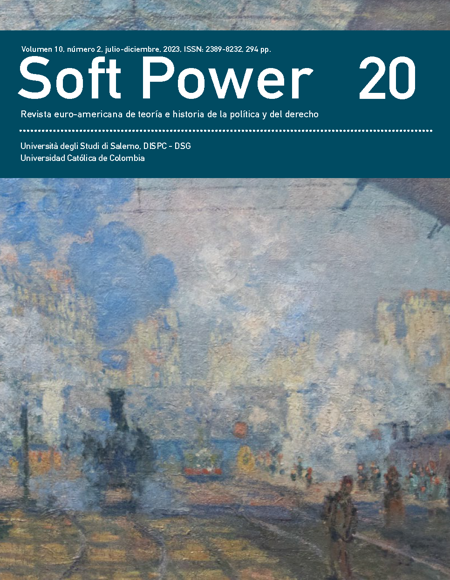
Esta obra está bajo una licencia internacional Creative Commons Atribución-NoComercial 4.0.
Al enviar los artículos para su evaluación, los autores aceptan que transfieren los derechos de publicación a Soft Power. Revista Soft Power para su publicación en cualquier medio. Con el fin de aumentar su visibilidad, los documentos se envían a bases de datos y sistemas de indización, así mismo pueden ser consultados en la página web de la Revista.Resumen
With the aim of presenting an overview of the history of “professional ethics” in Western
societies, Tiziana Faitini ends up offering us a powerful fresco of the forms of
self-realisation and social inclusion linked to the sphere of work and professional
activities that have developed from ancient Rome to the present day. The study of
the theme of “professionalism,” which at first glance seems to indicate nothing more
than the commitment to “doing one’s job well,” turns out, in this patient genealogical
analysis, to be a treasure trove of information and suggestions on the great themes of
ethical-religious vocation, political identity, social inclusion, and the realisation of the
individual’s innermost aspirations and desires. Beneath the tip of the iceberg of Max
Weber’s investigations on the Beruf and its inextricable intertwining of “vocation”
and “profession,” the book Shaping the Profession sheds light on a fascinating web
of spiritual, philosophical, political, and juridical texts spanning over two millennia.
Orations, sermons, and treatises alternate with constitutional norms, laws, and deontological
codes to “shape” the human activity of daily toil or creative genius. From
the common heritage of Medieval Latinity and Christianity to the different national
traditions (from Italy to England, from France to Germany), the universe of “arts” and
“crafts,” or rather of “making art” and “practising a craft,” is investigated through an
analysis of the voices of protagonists and performers. Shaping the Profession succeeds
in transforming an apparently secondary issue such as “professional ethics” into a major
theme of philosophical-political inquiry and in placing us, once again, in front of
the crucial philosophical questions of the meaning of work and its role in mediating
the individual’s belonging to society and a political community.

Citas
Hobbes, T. (1965 [1651]). Leviathan or The Matter, Forme and Power of a Commonwealth
Ecclesiasticall and Civill W.G. Pogson Smith (Ed.).. Oxford University Press.
Offer, J. (2019). Herbert Spencer, Sociological Theory and the Professions. Frontiers in
Sociology, 4, 77. https://doi.org/10.3389/fsoc.2019.00077
Schmitt, C. (1991 [1951]). Glossarium. Aufzeichnungen der Jahre 1947-1951. E. F. von
Medem (Ed.) Duncker & Humblot.
Schmitt, C. (2011 [1934]). Staatsgefüge und Zusammenbruch des Zweiten Reiches: Der
Sieg des Bürgers über den Soldaten. Duncker & Humblot. https://doi.org/10.3790/978-
-428-52362-7
Spencer, H. (1898 [1876]). Principles of Sociology (Vol. II). D. Appleton and Company.






